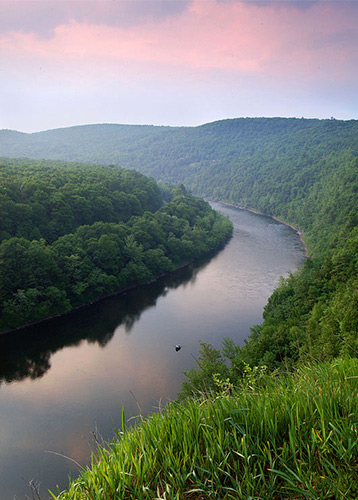Transcontinental Regional Energy Access Expansion (REAE Project)
Transcontinental Gas Pipe Line Company, LLC (“Transco”) proposes to construct a new natural gas pipeline called the Regional Energy Access Expansion (REAE). The project consists of 22.3 miles of 30-inch-diameter pipeline in Luzerne County, PA; 13.8 miles of 42-inch-diameter pipeline in Monroe County, PA; a gas-fired turbine driven compressor station in Gloucester County, NJ; and several other modifications to existing pipeline and compressor stations.
Transco REAE would impact 114 Exceptional Value (EV) wetlands and cross 77 waterbodies supporting cold water fisheries, 39 High Quality (HQ) streams, 2 Exceptional Value (EV) streams, 17 Class A Wild Trout Streams, and 57 waterbodies with naturally reproducing trout. Transco also inappropriately proposes to use an existing EV wetland as a mitigation site. Many of the streams that would be crossed by the project are cold water trout streams that are very sensitive to degradation. This project would also impact approximately 297 acres of forested woodlands. Clearing the forest around these streams exposes them to direct sunlight, raising the water temperature and jeopardizing their suitability as trout waters. Cutting forests and riparian buffers also creates habitat fragmentation. Transco fails to factor in not just the impacts of the fragmentation of the forest for these particular pipeline segments, but also by other cuts in the same region, either by Transco on its other pipeline pieces or by other pipeline/linear projects both within and outside the watershed. The project is also proposed to be constructed within the habitat of several threatened and endangered plant and animal species including white-fringed orchid, Indiana bat, northern long-eared bat, timber rattlesnake, and bog turtle. Transco also completely ignores impacts to vernal pools, which are not mentioned once in FERC’s Final Environmental Impact Statement.
Furthermore, Transco REAE would be an extreme detriment to regional climate change goals because it will consist of 47.8% of New Jersey’s GHG budget in 2050. Nothing is stopping FERC from certificating a second project that would consist of 65% of New Jersey’s 2050 GHG budget, thus, FERC would be virtually guaranteeing that New Jersey would not meet its emissions reductions goals, which is a large-scale issue that affects Pennsylvania as well. FERC also concluded that the REAE Project effects would be reduced to less-than-significant levels. This is despite the fact that FERC admitted that certain project components may be predominately borne by environmental justice communities and that climate change impacts would result in annual operation and downstream emissions of 16.62 million metric tons of carbon dioxide equivalent. These levels would exceed FERC’s presumptive significance threshold based on 100 percent utilization.




